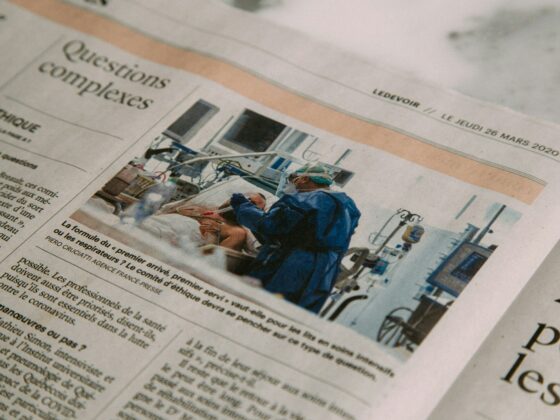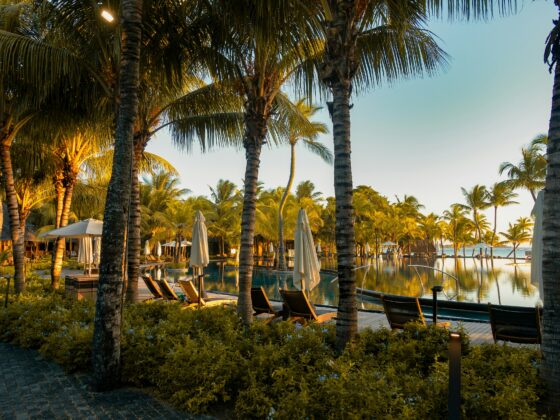Josiah: You were just named CEO of Accor’s luxury brand, Orient Express. Tell us a little bit more about this new role.
Gilda: It’s definitely one of the most exciting roles I’ve ever had in my life. This is a very special brand with a tremendous amount of legacy, history, brand equity. The fact that we’re making a very significant investment in terms of taking its heritage and making it even more relevant today, and I’ve been given the honor of leading that with the team here at Accor. It’s a dream for me. So I’m very, very excited to work with the team and to take the brand forward.
Josiah: It’s a really exciting brand. I feel the history of train travel, of voyages, it’s so storied and it’s included in so many movies and things like that. I was going through the website and I think the teams do a good job of telling that story. It’s got to be really interesting to step into that environment, as you say, with so much brand equity and legacy. How do you think about stewarding that history and moving it forward to what it can become?
Gilda:
Listen, we’re taking it very seriously. We do have brand historians, creative directors, an amazing design team reviewing all the archives. I mean, this is something that is of national and I would say European interest. Working with our partners, brands that were present inside the Orient Express over a hundred years ago. So, we’re being very meticulous about it. What you’ve seen, I don’t think it’s a reflection of what the brand is going to be. Let’s just say we’re at day one. Honestly, the opportunities are endless. This is a jewel that we have. This is treasure.

Josiah:
I’m really excited to see what you and your teams build with that. What is also interesting and exciting is, just this year you were named and you began this new role, in October of 2023, of group chief strategy officer at Accor. That is a role that you’re going to retain even as you are CEO of Orient Express. And Accor has so many brands. Such an incredible company. Tell us a little bit about why you took that job.
Gilda:
Oh, I think the answer I gave a friend of mine is, “Why not?” Honestly, Accor is one of the most exciting companies, I would say the most exciting company, in hospitality right now. It’s got amazing leadership with Sébastien Bazin. Him and I, we’ve known each other for a long time. We’ve been good friends. I like to say the first time I met him, I said to myself, “One day I’m going to do something, we’re going to work together, and I’m going to learn from him.”
And I tell you, what I’ve discovered since I set foot inside this organization, it’s been wonderful. There’s an amazing group of people, a can-do attitude. I like to speak, in past conversations about me, considering myself to be a global citizen. I tell you, I’ve met my tribe. They’re all global citizens here, which is really great. Everybody brings a level of expertise that I’ve never seen before. And so, it’s exciting.
And if you look back at what Accor has done since inception, but especially within the last 10 years, when Sébastien is taking the realm of the operation, taking the helm of the operations, it’s incredible. No other company has grown the way Sébastien has grown Accor. And so, that attitude of entrepreneurship with quite a bit of legacy, being in Paris, having a very fresh approach to life, to business, to corporate social responsibility, et cetera, for me, it’s been amazing. Again, I go back to the beginning of the answer. Why not? I’d be silly not to do it in my lifetime.
Josiah:
One of the things that really stood out to me when I was listening to Sébastien on some CEO panels at NYU Investment Conference and elsewhere, he always had a very different approach. It could be partially some of his approach, but I imagine there’s a lot of the culture there that is driving some of the way that Accor operates. I’m curious, what are some of the things that you’ve observed just a few months into this role now, as you’ve been talking to people? I imagine across the company, around the world. If you think about your prior role as global CEO of JLL, you saw so much of the industry, right? Now, you are in this collection of brands. What stands out to you as different?
Gilda:
There’s many things that are not dissimilar. When I was running the hospitality team at JLL, we were a group of about 400 individuals from around the world, all from different backgrounds. My immediate team was multicultural, multilingual. So, that global aspect of it, it’s here, but augmented at Accor.
I love traveling. I love meeting with different people, different backgrounds, learning about their cultures, seeing different things, different ways of doing things. That’s how I learn. And Accor has that. Every single day so far, and I know I’m new, so maybe there’s some of that, every day is completely different. I’m learning something else. There’s a lot of perspective here in the team.
And as I mentioned to you… You know what’s really interesting? There’s a very big component of the team that is legacy, who’ve been here for a very long time. There’s also a very big component of the team that is fairly new, let’s say maybe less than two years since they’ve been here. So, it’s a really nice balance of legacy with let’s say new know-how. And everybody’s an expert in their field. There’s no duplication of roles. Everybody’s bringing in their best in class act.
For me, it’s been fascinating, one, to see how welcoming everybody’s been. I mean, it really is a hospitality company. Everybody’s been more than wonderful. And everybody knows their craft better than anybody else who I have met before. So, it’s bringing that team together, having that same vision, even for somebody who’s been in the role for two months, that’s testament to the strong leadership that we have at the company.
Josiah:
I would love to hear you talk a little bit about how you’ve spent those last couple of months. Because you’re running strategy now for this really big influential company. How do you decide what those first few months look like in order to set yourself up for success?
Gilda:
Listen, I got a lot of advice before I joined from a lot of friends in the industry. Several of them you would consider competitors, but the beauty about our gen and the industry, it’s a very open, very friendly, very helpful industry. So, I got amazing advice. The best piece of advice that I got was, “Go, learn, listen, see, experience.” And that’s what I’ve been doing for the last two months.
I’ve been, obviously, participating and adding value as much as I could, but I also want to make sure that I come here with an unbiased approach. I’m listening, I’m getting the context behind, I’m getting the why. Why do we do things this way? Why is this our approach? What’s the context behind it? And when you’re going up an organization, even at JLL or anywhere for that matter, people are always very critical of, “Oh, I would do things this way.” Or, “Why was this decision taken?” Et cetera. And you don’t have the full context, you don’t have that vantage point. And so, that’s what I’m trying to perfect as much I could for the last eight plus weeks. Just observe, learn, and get the context.
I think the other bit, that for me was very exciting. I couldn’t have made a bigger change in my career. Yes, I stayed within the same industry. I stayed in hospitality, but it’s a different side of hospitality. It’s a different company. It’s a different organizational culture. It’s a different country. It’s a different language. So, everything is new. It would be a mistake for me to get in here day one and start undoing or doing without understanding the why we do things.
Josiah:
Across all of those conversations, have there been some things that have stood out to you or surprised you?
Gilda:
I knew the company was very global, but my God, it’s super global. It’s hyper global. I’ve never been in a more global-
Josiah:
What do you mean by that?
Gilda:
I’ve never been in a more global company than this one, and this has been amazing. I geek out on anything and everything, travel, global politics. This has it all, which is really great. I’ve met people from all corners of earth, which has been really great. Our reach as it relates to our local connections across many countries in the world, that is great. Relationships that we have with different embassies, that’s also really great. And so, that level of expertise from a geopolitical macroeconomic social perspective that is here in this company, I think it’s a wealth of knowledge. And so I’ve really, really enjoyed learning from the people in that side of the business.
Josiah:
I would love to hear your perspective on building strategic competitive advantage. Because I often hear this talked about on a brand level or people have a concept that they’re trying to establish. And Accor is unique because it has such a collection of brands. Even as a collection that are collections of brands, there’s so many different concepts that you’re building. I’m curious, leading global strategy for Accor, are there a couple core competencies that you feel the company does really well that you want to see it double down on, that you think are going to be important as being a collection of brands?
Gilda:
Absolutely. I think the main one is, we have been extremely respectful of those founder led brands. If you look at the brands that the group has acquired or partnered with over the last decade, if there’s a founder, that founder has remained in place. That DNA, the brand architecture has stayed intact. I really love that. Getting to know a lot of those personalities, hearing what their initial vision was when they were entrepreneurs either launching that concept or that brand, and how they’ve partnered with Accor to bring through the machine, that has been great. I would say that’s probably one of the main core competencies that I would like to see even more of.
The other one is, just because you’re in hospitality doesn’t mean that you have to just focus on the hotel or the guest room experience. We do have an incredible team of food and beverage and entertainment experts. We do massive catering and hospitality work with big events. World Cup recently in Qatar, the Olympic Games here in Paris next year. So, that level of expertise, that is incredible. From a food and beverage experiential perspective to the nth degree, what the Paris Society team have done, hands down, what they’ve done is just extraordinary. Paris Society just recently reopened Maxim’s. Tremendous amount of history, lots of stories to tell. The way the place was curated, how the experience has been curated, the attention to detail, wow, in terms of craftsmanship. I guess that’s what you get when you come to Europe, that’s what you get when you come to Paris. It is truly exquisite. So yes, that is also a very big competitive advantage.
I could go on and on. The team who leads sustainability here, they are definitely walking the walk. It’s not some PR campaign, greenwashing. I’m not suggesting everybody else is doing that, but I’m saying, this is, for us, incredibly important. The level of knowledge that exists in terms of regulatory compliance from a European Commission perspective or just global, and just doing good, and making sure that that is part of the DNA. We have the individual who leads that department. She’s absolutely extraordinary and expert in her field. For me, again, it’s refreshing to hear her speak. It’s like I’m getting a PhD level lecture every time. It’s again, that level of IQ, EQ. All that learning that I’ve been doing for the last several weeks, it’s been incredible. It’s been great.
Josiah:
Well, this is one of the advantages of having the global presence that you have. Because I think if you speak about something like sustainability, some countries it seems are a little further down the path in adopting some of these practices or there’s just talented individuals around the world. So when you have that global perspective, you can pull from the best of places or thought leaders and incorporate them into the business.
But I do want to underscore what you mentioned about founder led brands. Because in talking to some of the leadership team at Ennismore, talking with people on the ground at some of the properties among that collection of brands, and then actually talking to founder led brands, or brands that used to be founder led and that have become part of other companies has served as a bad example. But you see the power of that. And if you think across the collection of Ennismore brands, how those have thrived, I think a big piece of that is being founder led, which is exciting to see.
But to follow up on one point you made about expanding the scope of hospitality. You’ve been named CEO of Orient Express, which has this legacy of train travel. Do you feel there are growth opportunities in taking the practices of hospitality and then expressing it through some of the new ways that you mentioned, whether it is train travel or using space in different ways? Is that a big growth area for hospitality moving forward?
Gilda:
Oh, massive. I was doing a lot of work when I was at JLL on this subject. We were calling it the hotelization of real estate. But really, the application is, it’s immense. It is hospitality, its service is optimizing how we use space to your point. Here, just from the Ennismore umbrella, there’s the members club, there’s the food and beverage angle, there’s the coworking space. With Paris Society, again, it’s the entertainment space. There’s a residential division for branded residential, which you saw. It’s had its amazing boom. I guess as a result of the pandemic or since the pandemic, it’s grown at extraordinary levels.
So, there’s so much that all of us can do. And I would say, it’s not just hotel companies, but it’s anything and everything that has to do with living, right? Anything that has a bed in it, there’s an application there.
Even, by the way, people are rethinking offices too. How do we get people back to the office? How do we adapt it for the different needs that you have? Collaboration at certain times of the day, you need deep thinking space the other times of the day, you need to be inspired.
I was listening to a podcast, this was a while ago. The individual was talking about the fact that there aren’t the institutions that used to exist maybe 50 years ago, maybe a religious type of institution or family, community, whatever it is. But for a lot of people, that institution becomes the office, it’s where they work. That’s where you go and you share with your community, that’s where you go and learn, that’s where you go and you get inspired. There’s a certain set of values that the company or where you’re working, where you’re collaborating, is trying to impart on you. So, the office has now become a very important space. So how you curate that space to make people want to come to the office, want to share that knowledge, be able to grow and deliver on that network intelligence that you’re trying to get from a team, that’s very important. And those offices, those office buildings are taking pages out of the hotels’ hospitality playbook as well. We could have an hours-long chat on this subject alone. It really is fascinating.






